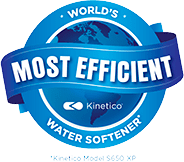If your tap water smells like rotten eggs, you’re not imagining it and you’re not alone. That nasty “sulfur” or “sewer” odor is usually caused by hydrogen sulfide gas or sulfur bacteria in the water.
The good news? It’s usually not unsafe. But it can make everyday things like showering, cooking or doing laundry pretty unpleasant.
The better news? There are proven ways to fix smelly water with the right testing and treatment.
How does hydrogen sulfide get into a home’s water supply?
Hydrogen sulfide, the most common cause of that rotten egg odor, can enter water in different ways including:
- Naturally occurring in groundwater, especially in private wells
- Bacterial activity converting sulfur compounds (such as sulfate) into hydrogen sulfide
- Chemical reactions inside your water heater, often involving the anode rod
- Sulfur bacteria may form smelly slime layers inside plumbing or water treatment equipment
- In rare cases, pollution or sewage contamination
When the hydrogen sulfide gas is released from your faucets, it smells like rotten eggs, even in your shower or laundry.
Is sulfur water harmful?
In most cases, hydrogen sulfide is not a health risk at low levels. However, it can:
- Corrode metal pipes and appliances
- Blacken or stain plumbing fixtures and silverware
- Create slimy buildup in plumbing systems
- Promote growth of other bacteria such as iron bacteria
- At higher concentrations, produce hazardous gas buildup in enclosed spaces such as well pits
If you’re on a well system, it’s a good idea to test your water for coliform bacteria and nitrate to rule out contamination from sewage or other sources.
Tests to find the source of the rotten egg smell
Before you treat the water, determine where the odor is coming from. Here’s a simple water test:
- Check both hot and cold water taps at multiple locations in your home.
- Note when the odor appears. Does it go away after running the water for a few minutes?
- Test untreated vs. treated water if you have a filtration or softening system in place.
How to interpret your results
| Smell Location | Likely Cause |
|---|---|
| Hot water only | Water heater issue (magnesium anode or bacteria) |
| Both hot and cold | Could be hydrogen sulfide in your source water or sulfur bacteria |
| Strong smell when water first runs, then fades | Sulfur bacteria in the distribution system caused by air pockets in plumbing |
| Persistent smell in all water | Likely hydrogen sulfide gas in the groundwater |
If you suspect an issue with your well, it’s wise to have your water tested for hydrogen sulfide, coliform bacteria, nitrate and iron bacteria.
How to fix the rotten egg odor in your water
Depending on the source, there are several ways to eliminate sulfur odors from your water.
- Water Heater Fixes
- Replace or remove the magnesium anode rod. This rod can trigger hydrogen sulfide gas formation. Swapping it with an aluminum anode or removing it entirely may help.
- Disinfect with a bleach solution (kills sulfur bacteria temporarily).
- Raise the heater temp to 160°F for several hours to kill the bacteria (use caution to avoid scalding).
- Shock Chlorination
If the smell comes from your well or plumbing system, you may need shock chlorination. This involves flushing your system with a high-strength chlorine solution. It’s recommended to hire a licensed well contractor or consult your state’s health department for proper guidance.
- Longer term Kinetico solutions:
Oxidation + Filtration Systems- Handles high hydrogen sulfide levels (over 6 ppm)
- Injects chlorine (or other oxidizer), then filters out the sulfur
- Requires proper design and maintenance
K5 Reverse Osmosis (RO) System- Best for drinking water
- Removes hydrogen sulfide along with dozens of other contaminants
Kinetico’s Sulfur Guard and RO Systems are effective solutions to combat odor, corrosion and staining. They leave you with water you’ll actually want to drink.
When to call a pro
Smelly water is a solvable issue, but the fix depends on the cause. If you’re unsure where the smell is coming from, or if the problem persists after treatment, it’s best to consult a water treatment specialist or licensed well contractor.
Stop holding your nose; Start loving your water
No one wants to bathe, cook or clean with water that smells like rotten eggs. It’s reassuring to know that whether it’s your water heater, softener, well or plumbing system, there are tested and proven solutions to have odor-free water flowing into your home.
Contact Haferman Water today to schedule a free water test or learn more about hydrogen sulfide solutions including Kinetico Sulfur Guard and Reverse Osmosis systems.









